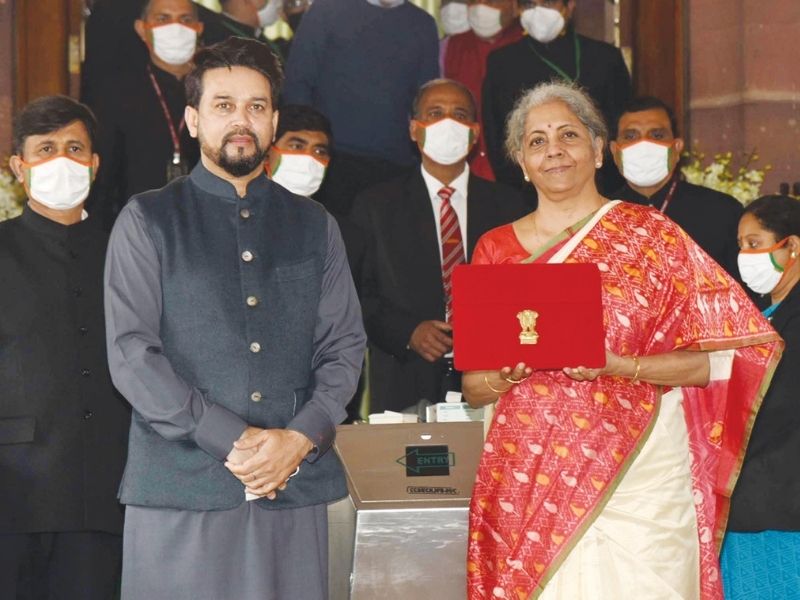
Finance minister Nirmala Sitharaman (right): human capital blindspot
Autar Nehru (Delhi)
The National Education Policy (NEP) 2020 hammered out after a gap of 34 years last July, promised to increase the national outlay for education to 6 percent of GDP. But in early 2020, a deadly new flu virus spread from Wuhan (China) and infected the world. On March 25, the Centre ordered a total lockdown of industry, business and all education institutions. But while the lockdown of the economy was gradually lifted in the next quarter onwards, education institutions are as yet cautiously reopening at the time of writing this despatch.
With the tax revenue of the Central and state governments sharply reduced because of the lockdown of the economy, it’s hardly surprising that far from being increased, the Centre’s outlay for education in the Union Budget 2021-22 at Rs.93,224 crore is 6 percent less than in 2020-21.
As a result, outlays for several projects of the recently renamed Union education ministry (hitherto the Union HRD ministry) have been slashed. The budget of the Integrated Child Development Services (ICDS) early childhood nutrition and education programme has been slashed by Rs.5,000 crore; the outlay for the free mid-day meal in government pre-primary and primary schools is reduced to Rs.11,500 crore from Rs.12,900 crore; the budget of the Samagra Shiksha Abhiyan (primary-secondary school) programme for 2021-22 is Rs.31,300 crore cf. Rs.38,751 budgeted for 2020-21 and the budget allocation of the department of school education & literacy for 2021-22 is Rs.54,873.66 crore against Rs.59,489 provisioned for the year ending March 31, 2021.
Although most informed monitors of the education scene were reconciled to the outlay for public education for 2021-22 being at best raised nominally given the huge shortfall in the Centre’s tax revenue because of lockdown of industry for an entire quarter (April-September), they express disappointment that the pandemic crisis didn’t result in overdue structural reforms in the education sector.
“Greater participation of the private sector and NGOs in managing and operating funds-starved government schools would have enabled them to modernise and upgrade. The finance minister should have provided edupreneurs and NGOs incentives to form public-private partnerships in K-12 education,” says Rustom Kerawalla, chairman of the Mumbai-based Ampersand Group which manages the pan-India Vibgyor Group of schools.
Adds Manit Jain, an alum of the Harvard School of Education and promoter of the Delhi-based Heritage Group of schools which includes the Heritage Xperiential School, Gurugram ranked the country’s #1 co-ed day school in the EW India School Rankings 2020-21: “Given the economic crisis precipitated by the Covid pandemic that has severely reduced government’s tax revenue, this was a good time for the BJP/NDA government to have invited private and foreign investment in Indian education. Development of the country’s human capital cannot — and should not — be neglected because of the government’s financial downturn.”
Nevertheless, there are several education enabling provisions in Union Budget 2021-22 that have been widely welcomed. They include transforming 15,000 government schools countrywide into model schools which will be “qualitatively strengthened to include all components of the National Education Policy 2020”; promoting 100 new Sainik Schools through public-private partnerships; establishing an “umbrella body” Higher Education Commission of India with “separate vehicles for standards-setting, accreditation, regulation and funding” and setting up a National Research Foundation.
However, the general consensus is that while the finance minister’s inability to augment the public education outlay in the unprecedented pandemic year is understandable, she missed a great opportunity to liberalise and deregulate India’s over-regulated and under-performing education sector. Congratulating the BJP/NDA government and the public for having successfully managed the Covid-19 pandemic, in her budget address Union finance minister Nirmala Sitharaman said: “This moment in history is the dawn of a new era — one in which India is well poised to truly be the land of promise and hope.”
Sorry Madam, this won’t happen without the country’s human resource being nurtured and developed — one way or another.
Also read: Major provisions for education in Union Budget 2021-22























